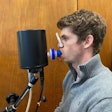
Increased perceived stress may cause worsened respiratory symptoms and decreased quality of life in people with COPD. That’s according to a study, “Perceived Stress Is Associated With Health Outcomes, Platelet Activation and Oxidative Stress in COPD,” published in Chronic Obstructive Pulmonary Diseases: Journal of the COPD Foundation.
In a news release, the researchers said perceived stress is used to describe how overwhelmed or stressed a person feels based on their personal understanding of a given situation. Along with other psychosocial factors, such as loneliness, social isolation and emotional support, it has been shown to impact health outcomes in people with chronic diseases.
The study evaluated data from the Comparing Urban and Rural Effects of Poverty on COPD (CURE COPD) study, which examined how obesity, poor diet and indoor air quality impacted former smokers with COPD living in low-income, urban areas. Specifically, the authors looked at the association between perceived stress and systemic inflammation.
What they found was in an urban cohort of low-income former smokers with COPD, perceived stress was associated with worse respiratory morbidity — particularly among those with severe COPD. There are several potential drivers for this psychosocial stress, the researchers wrote, including financial stress from the cost of health care and adverse social circumstances, such as neighborhood violence, community deprivation and emotional and physical neglect.
“There is increased evidence that psychosocial factors, including perceived stress, are associated with worsened respiratory symptoms for people with COPD. Platelet activation, which may contribute to inflammation, and oxidative stress, which may lead to cell and tissue damage, are also impacted by increased perceived stress,” said Obiageli Lynda Offor, MD, MPH, lead study author and pulmonary and critical care fellow at Johns Hopkins Medicine in Baltimore.
Although the study examined a small group of patients, Dr. Offor said the results “demonstrate the need for further research on how perceived stress impacts respiratory health and the importance of addressing psychosocial factors to help improve people’s quality of life.”























